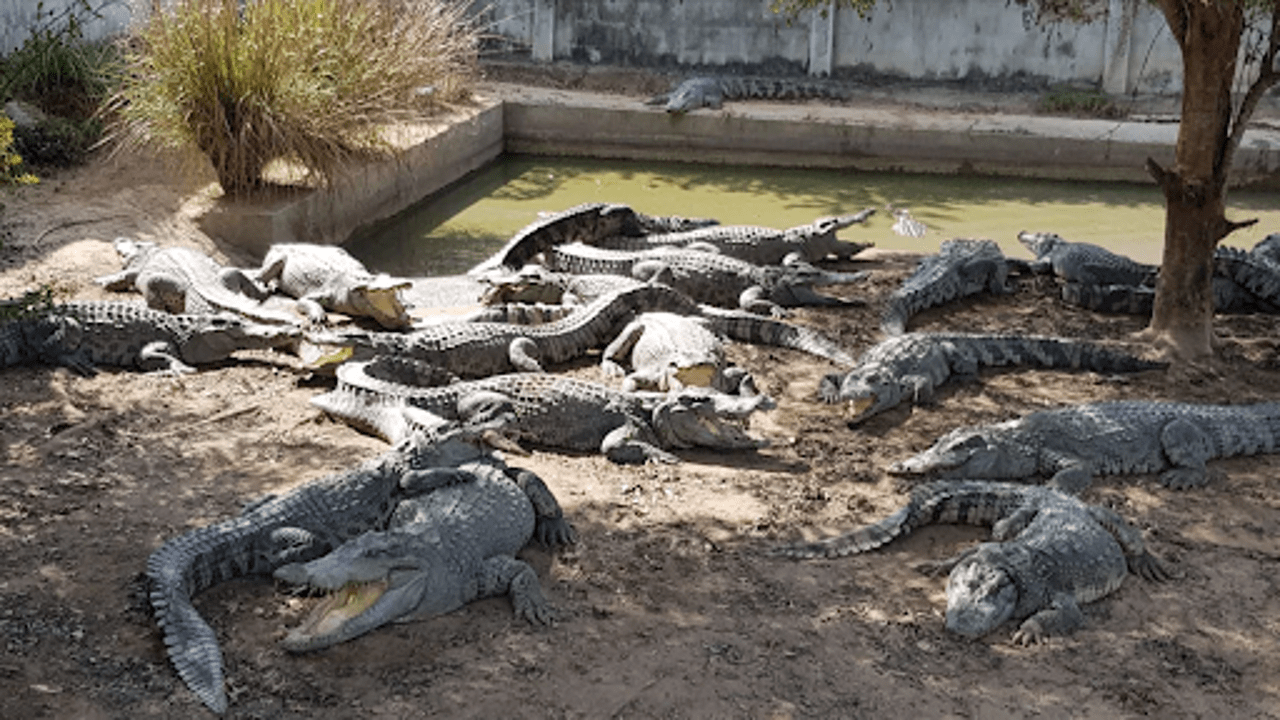
Siamese crocodiles are seen in their pen at a crocodile farm located in Lamphun, northern Thailand. Courtesy CrocodileLamphun
In the face of a devastating typhoon, a Thai crocodile farmer known as “Crocodile X” made the heartbreaking decision to euthanize over 100 critically endangered Siamese crocodiles to prevent them from escaping. The farmer, Natthapak Khumkad, 37, operates a crocodile farm in Lamphun, northern Thailand. He took this drastic action after realizing that the enclosure wall was compromised and might collapse, leaving the dangerous reptiles free to roam.
Natthapak acted swiftly after observing the damage from Typhoon Yagi, which has been described as Asia’s most powerful storm this year. The storm wreaked havoc across southern China and Southeast Asia, causing severe flooding in Thailand, resulting in the deaths of at least nine individuals and submerging homes and villages. Natthapak shared, “I had to make the most difficult decision of my life to kill them all,” emphasizing that the potential risk to the local community outweighed the painful choice he had to make.
Siamese crocodiles are classified as critically endangered, with only a few hundred remaining in the wild. Their dwindling numbers are attributed to hunting and extensive farming practices. Natthapak was faced with a difficult dilemma: finding a secure home for the crocodiles before the storm's aftermath worsened. Unfortunately, he could not find a suitable place that was large enough and secure enough to house them.
To avert a potential disaster in the local community, Natthapak made the painful decision to put down 125 crocodiles on September 22. He reflected on the situation, saying, “My family and I discussed if the wall collapsed the damage to people’s lives would be far bigger than we can control. It would involve people’s lives and public safety.”
Siamese crocodiles are classified as critically endangered, with estimates suggesting only a few hundred remain. Recently, over 100 of these crocodiles were euthanized at a farm in Lamphun, northern Thailand, after a typhoon compromised their habitat. Courtesy CrocodileLamphun
Typhoon Yagi brought heavy rains and strong winds, eroding the walls of the crocodile enclosure and heightening the urgency of the situation. The threat of extreme weather events is becoming more common due to climate change, as warmer ocean waters fuel storms, leading to more intense and frequent natural disasters. Experts warn that such disasters pose serious risks to wildlife and their habitats.
Despite the tragedy, Natthapak’s crocodile farm has operated for 17 years and has weathered many rainy seasons until now. He stated, “I had to make a decision in less than 24 hours when I saw the erosion progressed rapidly,” revealing that he had to use electrocution as a method to euthanize the crocodiles.
Local authorities, including Pornthip Nualanong, head of Lamphun’s fishery office, supported Natthapak’s choice, describing it as a “brave and responsible decision.” She acknowledged the serious public safety risks posed by potentially loose crocodiles in nearby agricultural fields.
Among those killed was Ai Harn, a notable 4-meter-long male breeder regarded as the leader of the pack. The visual impact of the tragedy was further amplified by footage of a digger removing the crocodile carcasses from the farm.
Although Siamese crocodiles are critically endangered, they remain a significant part of Thailand's crocodile farming industry, which generates substantial revenue annually. Natthapak’s farm, the largest in Lamphun, sells crocodile skins, meat, and exports dried crocodile products. Originally, his family’s business focused on selling roasted pigs and calves, but they transitioned to crocodile farming after recognizing the potential of utilizing leftover food for feeding.
Today, Natthapak still maintains a sizable population of approximately 500 baby crocodiles, ranging in length from 30 to 120 centimeters (1 to 4 feet). He continues to engage the public with entertaining videos featuring the crocodiles, showcasing his unique approach to crocodile farming in Thailand.















